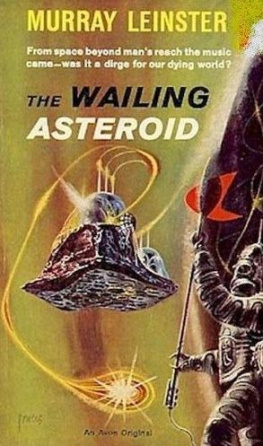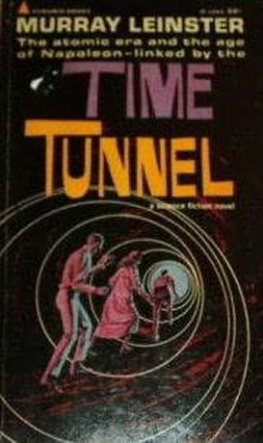The Wailing Asteroid
Murray Leinster
Chapter 1
THE SIGNALS from space began a little after midnight, local time, an a Friday.
They were first picked up in the South Pacific, just westward of the International Date Line. A satellite-watching station on an island named Kalua was the first to receive them, though nobody heard the first four or five minutes. But it is certain that the very first message was picked up and recorded by the monitor instruments.
The satellite-tracking unit on Kalua was practically a duplicate of all its fellows. There was the station itself with a vertical antenna outside pointing at the stars. There were various lateral antennae held two feet aboveground by concrete posts. In the instrument room in the building a light burned over a desk, three or four monitor lights glowed dimly to indicate that the self-recording instruments were properly operating, and there was a multiple-channel tape recorder built into the wall. Its twin tape reels turned sedately, winding a brown plastic ribbon from one to the other at a moderate pace.
The staff man on duty had gone to the installation's kitchen for a cup of coffee. No sound originated in the room, unless one counted the fluttering of a piece of weighted-down paper on the desk. Outside, palm trees whispered and rustled their long fronds in the southeast trade wind under a sky full of glittering stars. Beyond, there was the dull booming of surf upon the barrier reef of the island. But the instruments made no sound. Only the tape reels moved.
The signals began abruptly. They came out of a speaker and were instantly recorded. They were elfin and brutelike and musical. They were crisp and distinct. They did not form a melody, but nearly all the components of melody were there. Pure musical notes, each with its own pitch, all of different lengths, like quarter-notes and eighth-notes in music. The sounds needed only rhythm and arrangement to form a plaintive tune.
Nothing happened. The sounds continued for something over a minute. They stopped long enough to seem to have ended. Then they began again.
When the staff man came back into the room with a coffee cup in his hand, he heard the flutings instantly. His jaw dropped. He said, "What the hell?" and went to look at the instruments. He spilled some of his coffee when he saw their readings.
The tracking dials said that the signals came from a stationary source almost directly overhead. If they were from a stationary source, no plane was transmitting them. Nor could they be coming from an artificial satellite. A plane would move at a moderate pace across the sky. A satellite would move faster. Much faster. This source, according to the instruments, did not move at all.
The staff man listened with a blank expression on his face. There was but one rational explanation, which he did not credit for an instant. The reasonable answer would have been that somebody, somewhere, had put a satellite out into an orbit requiring twenty-four hours for a circuit of the earth, instead of the ninety to one-hundred-twenty-four-minute orbits of the satellites known to sweep around the world from west to east and pole to pole. But the piping, musical sounds were not the sort of thing that modern physicists would have contrived to carry information about cosmic-particle frequency, space temperature, micrometeorites, and the like.
The signals stopped again, and again resumed. The staff man was galvanized into activity. He rushed to waken other members of the outpost. When he got back, the signals continued for a minute and stopped altogether. But they were recorded on tape, with the instrument readings that had been made during their duration. The staff man played the tape back for his companions.
They felt as he did. These were signals from space where man had never been.
They had listened to the first message ever to reach mankind from the illimitable emptiness between the stars and planets. Man was not alone. Man was no longer isolated. Man
The staff of the tracking station was very much upset. Most of the men were white-faced by the time the taped message had been re-played through to its end.
They were frightened.
Considering everything, they had every reason to be.
The second pick-up was in Darjeeling, in northern India. The Indian government was then passing through one of its periods of enthusiastic interest in science.
It had set up a satellite-observation post in a former British cavalry stable on the outskirts of the town. The acting head of the observing staff happened to hear the second broadcast to reach Earth. It arrived some seventy-nine minutes after the first reception, and it was picked up by two stations, Kalua and Darjeeling.
The Darjeeling observer was incredulous at what he heard-five repetitions of the same sequence of flute-like notes. After each pause-when it seemed that the signals had stopped before they actually did so-the reception was exactly the same as the one before. It was inconceivable that such a succession of sounds, lasting a full minute, could be exactly repeated by any natural chain of events.
Five repetitions were out of the question. The notes were signals. They were a communication which was repeated to be sure it was received.
The third broadcast was heard in Lebanon in addition to Kalua and Darjeeling.
Reception in all three places was simultaneous. A signal from a nearby satellite could not possibly have been picked up so far around the Earth's curvature. The widening of the area of reception, too, proved that there was no new satellite aloft with an orbit period of exactly twenty-four hours, so that it hung motionless in the sky relative to Earth. Tracking observations, in fact, showed the source of the signals to move westward, as time passed, with the apparent motion of a star. No satellite of Earth could possibly exist with such an orbit unless it was close enough to show a detectable parallax. This did not.
A French station picked up the next batch of plaintive sounds. Kalua, Darjeeling, and Lebanon still received. By the time the next signal was due, Croydon, in England, had its giant radar-telescope trained on the part of the sky from which all the tracking stations agreed the signals came.
Croydon painstakingly made observations during four seventy-nine-minute intervals and four five-minute receptions of the fluting noises. It reported that there was a source of artificial signals at an extremely great distance, position right ascension so-and-so, declination such-and-such. The signals began every seventy-nine minutes. They could be heard by any receiving instrument capable of handling the microwave frequency involved. The broadcast was extremely broadband. It covered more than two octaves and sharp tuning was not necessary. A man-made signal would have been confined to as narrow a wave-band as possible, to save power for one reason, so it could not be imagined that the signal was anything but artificial. Yet no Earth science could have sent a transmitter out so far.
When sunrise arrived at the tracking station on Kalua, it ceased to receive from space. On the other hand, tracking stations in the United States, the Antilles, and South America began to pick up the cryptic sounds.
The first released news of the happening was broadcast in the United States. In the South Pacific and India and the Near East and Europe, the whole matter seemed too improbable for the notification of the public. News pressure in the United States, though, is very great. Here the news rated broadcast, and got it.
That was why Joe Burke did not happen to complete the business for which he'd taken Sandy Lund to a suitable, romantic spot. She was his secretary and the only permanent employee in the highly individual business he'd begun and operated. He'd known her all his life, and it seemed to him that for most of it he'd wanted to marry her. But something had happened to him when he was quite a small boy-and still happened at intervals-which interposed a mental block.



